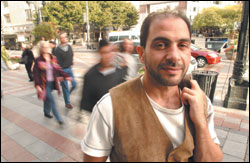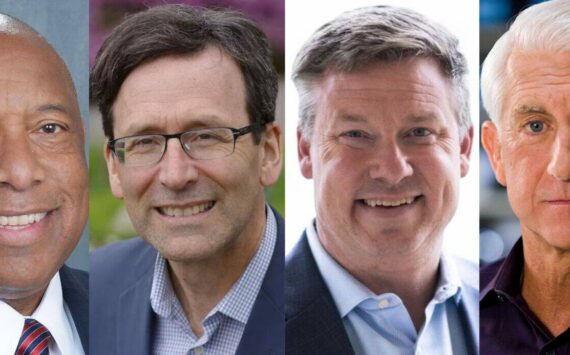It was the evening of Sept. 13, 2001, two days after the terrorist attacks. Jordanian immigrant ISSA QANDEEL was leaving the Idriss Mosque in North Seattle after the last prayer service of the day, walking slowly to the parking lot as he talked with a friend about the horrors of the attack. As they reached Qandeel’s Jeep Grand Cherokee, they spotted liquid beneath the car, and then a man lurking behind it carrying a gas can and a gun.
“I said, ‘Shoot, but tell me first what you’re going to shoot me for,'” Qandeel remembers. Instead, according to Qandeel, the furtive figure tried to fire three times but the gun failed. Qandeel says he chased the attacker, whereupon the man turned around, shot one more time, and missed. (The attacker, Patrick Cunningham, has said in court documents that he was only trying to scare Qandeel, not shoot him.) A chase ensued, ending only when the man got in his car and drove wildly into a telephone pole.
The incident, covered widely in the press at the time, was only the beginning of the story. Even more noteworthyand inspiringwas what Qandeel did next. “My plan was really to help him right from the start,” Qandeel says of the man he thinks tried to kill him and who, at the very least, wanted to set cars outside the mosque ablaze because of his feelings toward Muslims in light of 9/11.
As a Muslim, Qandeel, 34, believes that forgiveness is a way to get closer to God. What’s more, he says his background in Jordan taught him that good people can be deceived into doing bad things by the government or the media. Of Palestinian descent, Qandeel spent much of his childhood in a refugee camp, where he faced discrimination by Jordanians and observed the cycle of violence that is Middle East politics. Rising to become a mechanical engineer and now working for a downtown architectural firm, he looks at Cunninghama middle-aged high-school graduate who said he had spent the days after 9/11 drinking and watching TV in shockas a victim of inaccurate portrayals of Muslims.
So when it seemed that authorities were trying to make an example of Cunningham, filing four charges against him in federal court that could have sent him to jail for up to 75 years, Qandeel objected. “I told them I wanted to drop the charges,” he says. That wasn’t possible. But Assistant U.S. Attorney Donald Currie says that Qandeel’s “amazing” attitude of forgiveness, echoed in sentiments expressed by the mosque, influenced the government in negotiating a plea bargain with Cunningham, in which two of the charges were dropped.
Qandeel didn’t stop there. He testified at Cunningham’s sentencing hearing, speaking movingly about the uselessness of retribution and requesting leniency. “I told them, ‘Nothing would make me happier than this gentleman leaving the court with me today,'” Qandeel says. In the end, Cunningham got six and a half years instead of 75.
At some point before the sentencing, Qandeel tried to see Cunningham in jail. “I just wanted to go and introduce myself to him, to tell him, ‘This is the person you were trying to kill,’ to tell him about my familythat I take care of seven brothers and sisters after my father passed away.
“I was hoping to touch his heart and get him out of the cycle of hatred,” Qandeel says.
Qandeel says Cunningham wouldn’t see him, perhaps because of a no-contact order that forbade Cunningham from communicating with members of the mosque. It’s uncertain if his heart was touched. But Cunningham, who used to work driving disabled people to appointments, did write a four-page, handwritten apology to the mosque in which he referred to “the two brave men of your congregation,” presumably Qandeel and the friend who was with him on the night of the attack.
Qandeel was brave for facing down his attacker that night, but reaching out to him afterward took a different kind of heroism, one that in this time of war and bitterness we could surely use more of.Nina Shapiro
info@seattleweekly.com




